How To Become an Autism Support Teacher
Pursuing a Rewarding Career in Autism Education

Understanding the Path to Becoming an Autism Support Teacher
A career as an autism support teacher offers the opportunity to impact lives profoundly by providing specialized education and support to children on the autism spectrum. This guide explores the necessary qualifications, educational pathways, certifications, essential skills, and steps involved in entering this fulfilling profession.
Educational Foundations and Degree Requirements
What degree is required to become an autism support teacher, and are there specialized programs?
Entering the field of autism support teaching typically begins with obtaining at least a bachelor's degree. All states mandate that prospective special education teachers, including those working with autistic students, hold a bachelor's degree in Education, Psychology, Social Work, Human Services, or a related field. This foundational qualification ensures that educators have the necessary background in teaching principles and understanding of developmental and behavioral issues.
Among the most popular degree programs is 'Special Education and Teaching, General,' which saw 22,620 completions in 2023. This program specifically prepares students with the skills and knowledge needed to teach children with diverse learning needs, including those on the autism spectrum.
In addition to a bachelor's degree, some roles or states may prefer or require candidates to pursue further education, such as a master's degree. Many employers look favorably upon candidates with master's credentials in behavior analysis, autism education, or related disciplines, especially if they belong to organizations like the Behavior Analyst Certification Board (BACB) or the Association for Behavior Analysis International (ABAI). Achieving a master's degree not only broadens a candidate's expertise but also opens pathways to advanced certifications which can enhance employment prospects.
There are specialized programs around autism and applied behavior analysis (ABA) that integrate coursework and supervised fieldwork. These programs focus on evidence-based practices essential for effective intervention and support for autistic individuals. Some universities also offer tailored training modules in autism, covering behavior management, communication strategies, and individualized intervention planning.
For those interested in behavioral intervention roles, obtaining certification such as the Board Certified Behavior Analyst (BCBA) involves completing a master's degree with coursework verified by BACB, accumulating supervised experience, and passing a comprehensive exam. This certification is highly valued and often required for advanced behavioral intervention roles.
In summary, the educational route to becoming an autism support teacher involves starting with a relevant bachelor's degree, with many advancing to a master's program in autism or behavior analysis. Specialized programs and certifications provide additional skills and credibility, enabling educators to deliver highly effective support tailored to the needs of autistic students.
Qualifications and Experience Needed
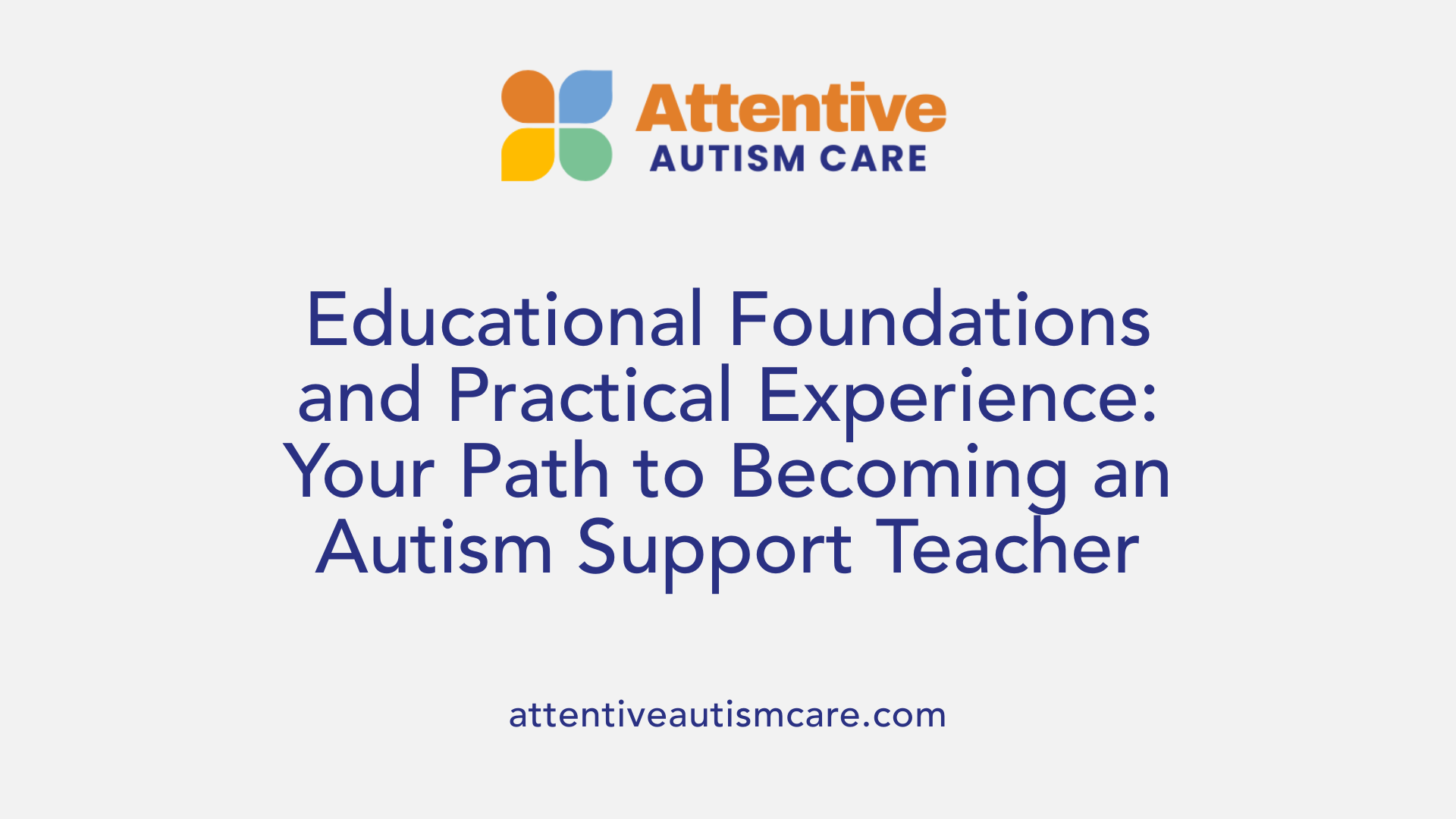
What qualifications are necessary to work as an autism support teacher?
To pursue a career as an autism support teacher, candidates generally must possess a bachelor's degree in a relevant field such as education, psychology, speech-language pathology, or occupational therapy. All states mandate that prospective special education teachers earn at least this undergraduate degree to become certified in their roles.
In addition to a bachelor's degree, most states require candidates to obtain certification or licensure specifically in special education. This certification process typically includes passing a licensing examination and completing a student teaching or practicum experience ranging from three to 12 months. Some states offer a window during which teachers can earn a master's degree after obtaining initial licensure, with specific states requiring that this advanced degree be in Special Education or a closely related field.
Having an extra credential, such as a certification in autism spectrum disorder (ASD), behavior analysis (like BCBA), or an autism specialist certification, can boost a teacher’s qualifications and effectiveness. Such certifications often involve specialized training programs that cover autism spectrum disorder, behavior management, IEP development, and other relevant topics.
Moreover, additional certifications from reputable organizations like IBCCES include programs such as the Certified Autism Specialist™ (CAS) and Autism Certificate (AC). CAS requires a bachelor's degree plus extensive experience or a master's degree with additional continuing education, costing approximately $495. The AC is suitable for those actively providing services to autistic individuals and costs around $295.
State certification or licensure in special education, often with an autism focus
All states require prospective teachers working with autistic children to complete an approved teacher preparation program and to obtain state certification. This certification process generally involves passing a legal and content knowledge exam, completing supervised student teaching, and passing a background check. Many states also incorporate assessments specific to special education, such as teaching strategies for ASD.
Some states allow a transition period where teachers can complete advanced degrees after licensure, which helps accommodate working professionals and career changers. Specific requirements can vary by state, but all emphasize the importance of practical experience and assessment.
Additional credentials such as behavior analysis certifications or autism specialist certs
Beyond standard certification, many professionals working with autism pursue additional credentials in behavior analysis, such as becoming a Board Certified Behavior Analyst (BCBA). These credentials qualify individuals to design and oversee behavior intervention plans based on evidence-based practices.
Individuals interested in specialized autism support roles can choose certifications like the IBCCES Autism Spectrum Disorder (ASD) Specialist Certification or Advanced Autism Certificates (AAC). These programs focus on understanding autism, managing behaviors, developing individualized education programs (IEPs), and fostering communication with parents.
Having these certifications often requires additional coursework, supervised fieldwork, and a commitment to ongoing professional development. The costs for certifications vary but tend to include fees for training, examinations, and renewal, ensuring that professionals stay updated on the latest practices.
| Qualification Type | Typical Requirements | Cost/Duration | Focus Areas |
|---|---|---|---|
| Bachelor's Degree in Education/Related Fields | Completion of a relevant undergraduate program | Usually covered in standard degree | General teaching skills, foundational knowledge of ASD |
| State Certification in Special Education | Passing licensure exam, supervised student teaching, background check | Varies by state | Teaching strategies, laws, and regulations in special education |
| Autism Spectrum Disorder Certification | Specialized training in autism, behavior management, IEP development | $295 - $495; varies, online programs | Autism-specific skills, behavior intervention, communication strategies |
| Behavior Analysis Certification (BCBA) | Master’s degree, supervised clinical hours, passing exam | Cost varies; time commitment varies | Behavior analysis, intervention design, data collection |
Professionals aiming to work effectively with autistic children are encouraged to choose relevant degrees, gain practical experience, and pursue recognized certifications to tailor their skills to the needs of their students and ensure compliance with state and professional standards.
Training and Certification Programs
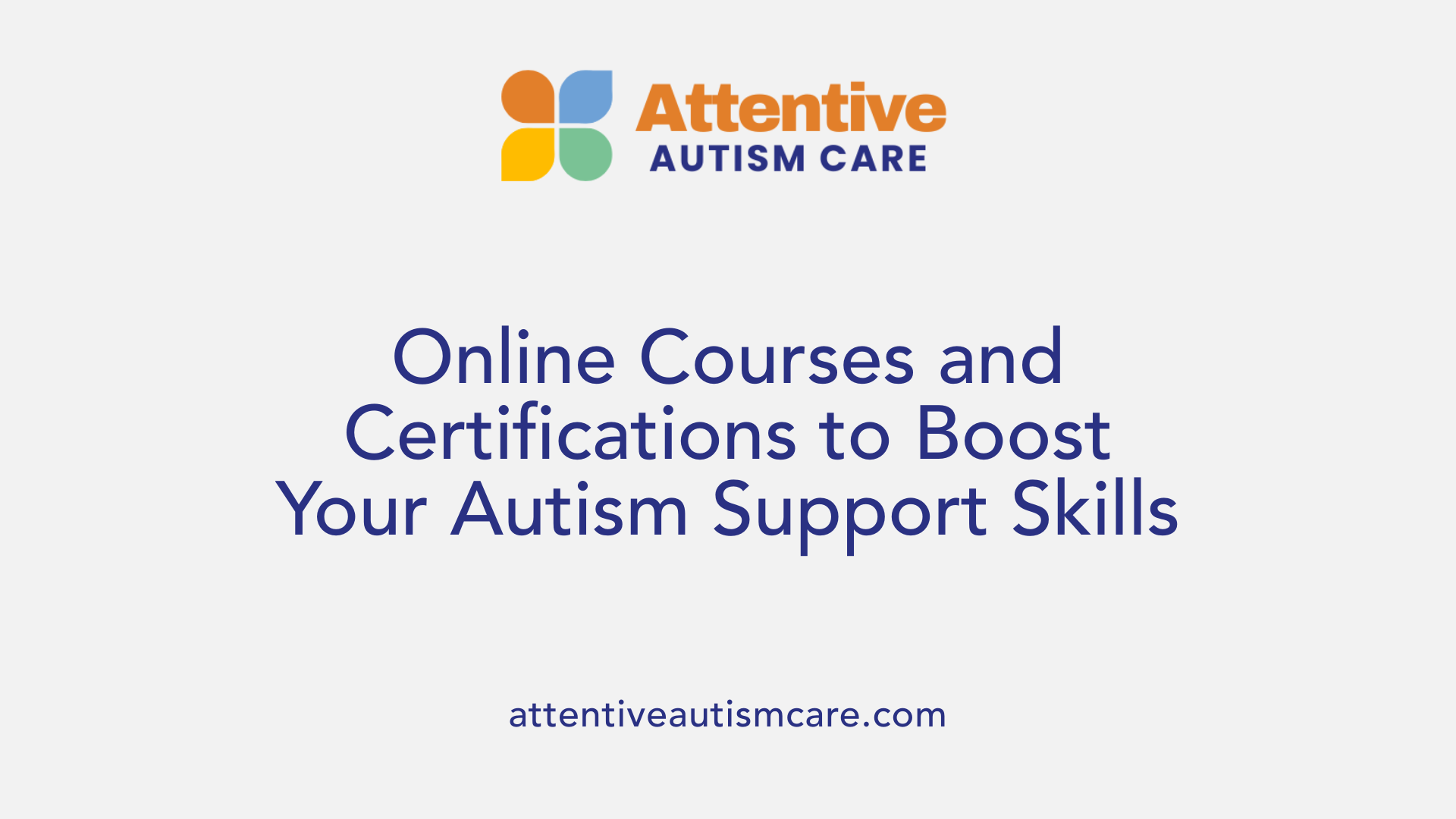
Are there online training programs available to become an autism support teacher?
Yes, online training programs are widely accessible and cater to a range of needs for those interested in working with autistic individuals. Organizations like IBCCES (International Board of Credentialing and Continuing Education Standards) offer comprehensive online certifications such as the Certified Autism Specialist™ (CAS) and Autism Certificate (AC). These programs cover vital topics including autism overview, behavior management, development of individualized education programs (IEPs), early childhood identification, and working with families.
Many universities and professional development platforms also provide online courses tailored to autism support. These courses are designed to enhance knowledge in areas such as communication strategies, behavioral interventions, and inclusive educational practices. Completing such programs can bolster a candidate’s qualifications, especially for roles that require specialized skills.
Before enrolling, it’s important to verify that the chosen program aligns with your state’s certification requirements and professional goals. Online courses often offer flexibility for working adults or those transitioning careers, making them a practical choice for enhancing skills or achieving certification.
How long does it typically take to become an autism support teacher?
The timeline to become an autism support teacher varies based on educational background and certifications pursued. Generally, earning a bachelor’s degree in fields like special education, psychology, speech-language pathology, or occupational therapy takes around 3 to 4 years.
Following the degree, obtaining specific certifications can extend your preparation time. For instance, achieving the Certified Autism Specialist™ (CAS) certification requires a bachelor’s degree plus ten years of relevant experience, or a master’s degree with two years of experience and completion of 14 CE hours. The process of gaining experience and completing additional coursework can add another 1 to 2 years.
Specialized certifications such as becoming a Board Certified Behavior Analyst (BCBA) involve graduate coursework, supervised fieldwork (typically 1,500 to 2,000 hours), and passing a comprehensive exam. This pathway can take approximately 4 to 6 years or longer.
Overall, preparing to work effectively in autism support roles often spans several years, with ongoing professional development to maintain and renew certifications. Early immersion through internships or volunteering can also speed up practical experience building.
Additional Certifications and Professional Development
Beyond initial degrees, there are numerous certifications that enhance credentials for autism support professionals. These include the Autism Spectrum Disorder (ASD) Specialist Certification, Behavior Analyst Certification (BCBA), and Applied Behavior Analysis (ABA) training.
Programs like IBCCES’s offerings are designed for educators, speech-language pathologists, behavior analysts, and support staff, providing advanced knowledge and practical skills.
| Certification Type | Requirements | Cost | Purpose and Focus |
|---|---|---|---|
| Certified Autism Specialist™ (CAS) | Bachelor’s degree + 10 years experience OR Master’s + 2 years + 14 CE hours | $495 | Autism overview, behavior intervention, IEP development, family communication |
| Autism Certificate (AC) | Currently providing services to autistic individuals | $295 | Autism fundamentals, behavior strategies, support techniques |
| BCBA | Master’s in Behavior Analysis or related field, supervised hours, exam | Varies | Behavior intervention and analysis in clinical and educational settings |
| ABA Therapy Training | Completion of training courses, supervised fieldwork | Varies | Applied behavior analysis techniques for intervention |
Which roles can work with autistic children?
Professionals working in autism support often pursue related degrees and certifications depending on their specific role. These include teachers’ aides, registered behavioral technicians (RBT), special education teachers, speech-language pathologists, occupational therapists, and behavioral analysts.
Additional roles include autism support workers, behavior interventionists, and family support specialists. Each role may require different levels of education, experience, and certification but all focus on enhancing the development and well-being of autistic individuals.
Pathways to a career in autism support
Prospective professionals should identify their primary interest within autism support—whether it’s behavioral therapy, speech therapy, or educational support—and then pursue relevant degrees and certifications.
Gaining practical experience through volunteering, internships, or student teaching is crucial. Many programs, like GaTAPP (Georgia Teacher Alternative Preparation Program), are designed for career changers and working adults, usually taking one to two years.
Continued education and certification renewal are vital for maintaining expertise and adhering to evolving standards in autism support practices. Professionals who stay informed and adaptable can effectively support autistic individuals across a variety of settings.
Practical Experience and Clinical Preparation
What does an autism support teacher do?
An autism support teacher provides specialized instruction and individualized support to students with autism spectrum disorder (ASD) to promote their academic, social, and emotional development. They utilize a range of strategies, including communication techniques, sensory accommodations, and behavioral interventions, often guided by expertise such as ABA. These teachers are trained to handle crises effectively, de-escalate challenging behaviors, and respond safely to emergency situations involving students on the spectrum. They collaborate closely with parents, caregivers, and a team of specialists to implement tailored educational plans that meet each student’s unique needs. Overall, autism support teachers strive to create a compassionate, understanding environment that fosters growth, inclusion, and independence for students with autism.
Student teaching requirements from 3 to 12 months supervised experience
All states mandate prospective autism support teachers to complete a student teaching or practicum experience as part of their certification process. This period typically ranges between three to twelve months, depending on state regulations and the specific certification program.
During student teaching, candidates gain valuable hands-on experience under the supervision of a certified teacher or a qualified mentor. This phase allows aspiring educators to apply theoretical knowledge in real classroom settings, develop classroom management skills, and refine instructional techniques tailored for students with special needs.
Supervised student teaching usually involves working directly with students, planning lessons, assessing progress, and implementing individualized strategies. This on-the-ground training is crucial for understanding how to adapt instruction to meet diverse learning styles and behavioral challenges characteristic of children with autism.
Internships and volunteer roles such as teaching assistants or behavior technicians
Apart from formal student teaching, internships and volunteer roles serve as vital stepping stones for aspiring autism teachers. Positions such as teaching assistants, behavior technicians, or support staff provide exposure to the daily routines and challenges of working with children on the spectrum.
These roles often involve assisting lead teachers in classroom activities, supporting behavior management, and implementing intervention strategies. For example, registered behavioral technicians (RBTs) work closely with students to carry out behavior plans developed by analysts, gaining practical experience in applied behavior analysis (ABA) therapies.
Volunteering during field placements, clinics, or community programs offers additional opportunities to observe, learn, and build relationships with children with autism. These experiences enhance understanding of sensory needs, communication techniques, and behavioral strategies, making candidates more prepared for formal teaching roles.
Gaining hands-on experience in classrooms and behavioral intervention settings
A critical component of preparation involves actively gaining hands-on experience within classrooms and specialized intervention environments. This practical engagement allows future teachers and specialists to develop crucial skills such as behavioral assessment, data collection, and implementation of individualized programs.
In classroom settings, educators learn how to differentiate instruction, manage complex behaviors, and foster social skills. In behavioral intervention contexts, such as clinics or therapy centers, individuals observe and participate in structured strategies like ABA, which is often foundational for effective autism support.
Many programs also recommend shadowing experienced professionals, participating in open house days, and attending training workshops focused on autism best practices. Collectively, this real-world exposure helps aspiring autism support professionals become confident, competent in providing empathetic, tailored assistance to students with diverse needs.
Characteristics and Personal Qualities of Effective Autism Support Teachers
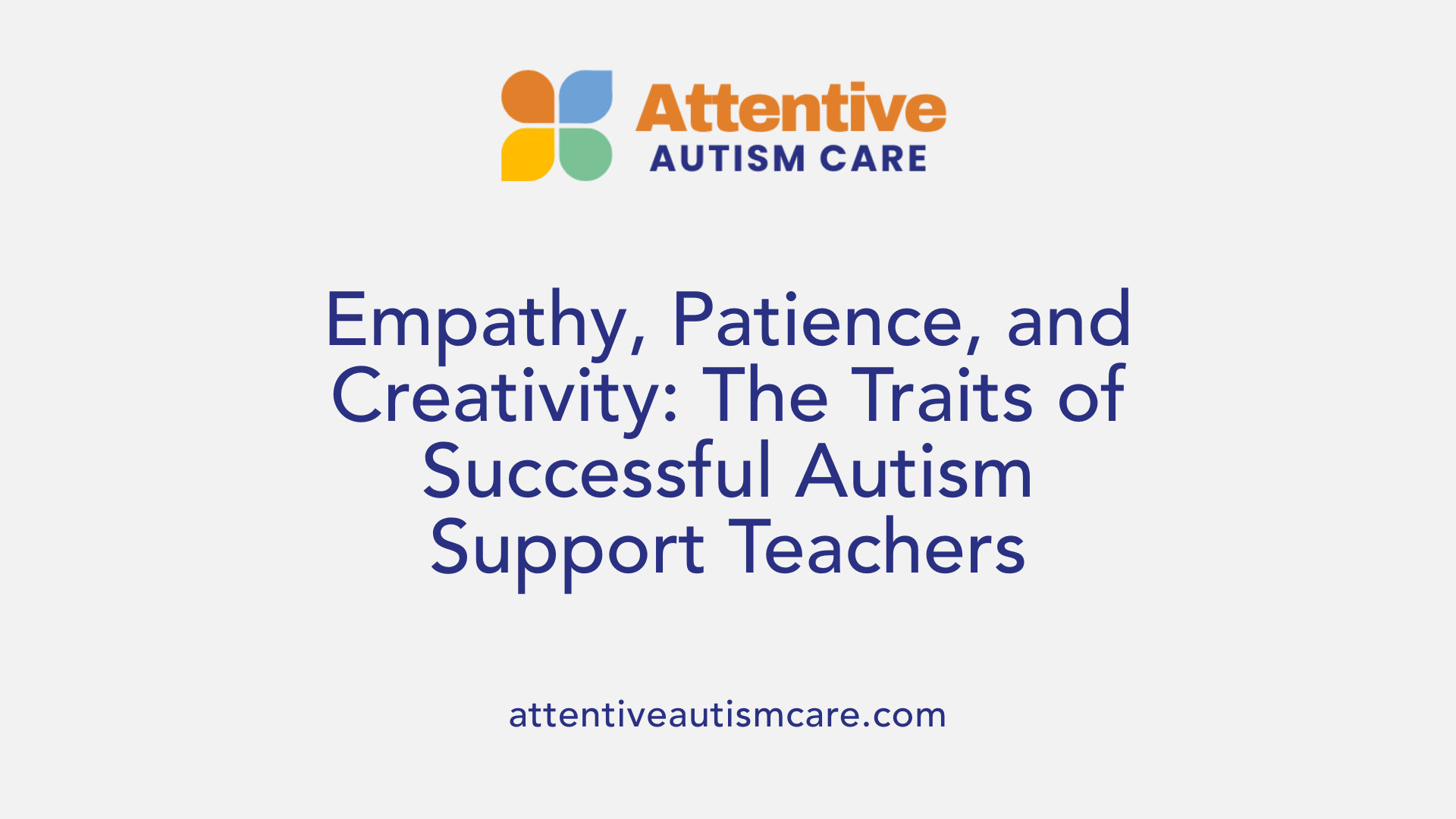
What characteristics are important for an autism support teacher?
Effective autism support teachers possess a blend of personal and professional qualities that help them meet the unique needs of their students. Key traits include empathy, patience, and understanding, which are essential for building trust and creating a supportive environment.
Additionally, strong communication skills enable teachers to convey information clearly to students and collaborate effectively with parents and other professionals. Organizational skills help manage individualized education plans (IEPs) and classroom activities efficiently.
Creativity and adaptability are crucial to designing engaging lessons tailored to each student's abilities and interests. A positive attitude fosters motivation and resilience, encouraging students to progress and thrive.
Other important qualities include attentiveness, curiosity about autism, and a solid knowledge base of autism spectrum disorders. These traits allow teachers to respond flexibly to challenging situations, address diverse learning styles, and promote developmental growth.
Core skills sought in autism teaching positions
Apart from personal qualities, employers commonly look for skills such as effective lesson planning, strong communication, and teaching capabilities. Proficiency in developing and implementing IEPs, along with the ability to foster inclusive classroom environments, are highly valued.
The combination of personal traits and practical skills equips autism teachers to make a meaningful difference in their students' educational and social lives.
Pathways and certifications to enhance personal qualities
Many programs, including online certifications from organizations like IBCCES, focus on strengthening these qualities. Certifications such as the Certified Autism Specialist™ and Autism Certificate provide training in areas like behavior management, parent communication, and program development.
These programs emphasize developing empathy, patience, and curiosity—traits that are essential for working effectively with children with autism.
Overview of characteristics of a good autism support teacher
| Trait | Description | Importance |
|---|---|---|
| Empathy | Understanding students' feelings and perspectives | Helps build trust and provides tailored support |
| Patience | Remaining calm during challenging behaviors | Facilitates positive learning experiences and progress |
| Knowledge of Autism | Understanding spectrum disorders and related strategies | Ensures effective intervention and educational planning |
| Attentiveness | Monitoring student responses and needs | Allows timely adjustments and personalized attention |
| Curiosity | Desire to learn about autism and new teaching methods | Promotes continuous improvement and innovation |
| Creativity | Designing engaging, effective lessons | Keeps students motivated and eager to learn |
| Adaptability | Altering approaches based on student needs | Responds flexibly to challenges and diverse learners |
| Organization | Managing classroom activities and IEPs efficiently | Supports structured and consistent learning environment |
| Positivity | Maintaining an optimistic outlook | Encourages resilience in students and fosters a nurturing classroom atmosphere |
Final thoughts
The qualities of a good autism support teacher extend beyond academic knowledge. They include a blend of empathy, patience, creativity, and adaptability that enable educators to meet each child's unique needs. Combining these traits with professional skills and relevant certifications creates a strong foundation for success in this rewarding field.
For those interested, exploring additional qualifications such as the Autism Spectrum Disorder (ASD) Specialist Certification or Board Certified Behavior Analyst (BCBA) can further enhance personal qualities and professional expertise, ultimately benefitting students with autism and their families.
Supporting Professional Development and Ongoing Education
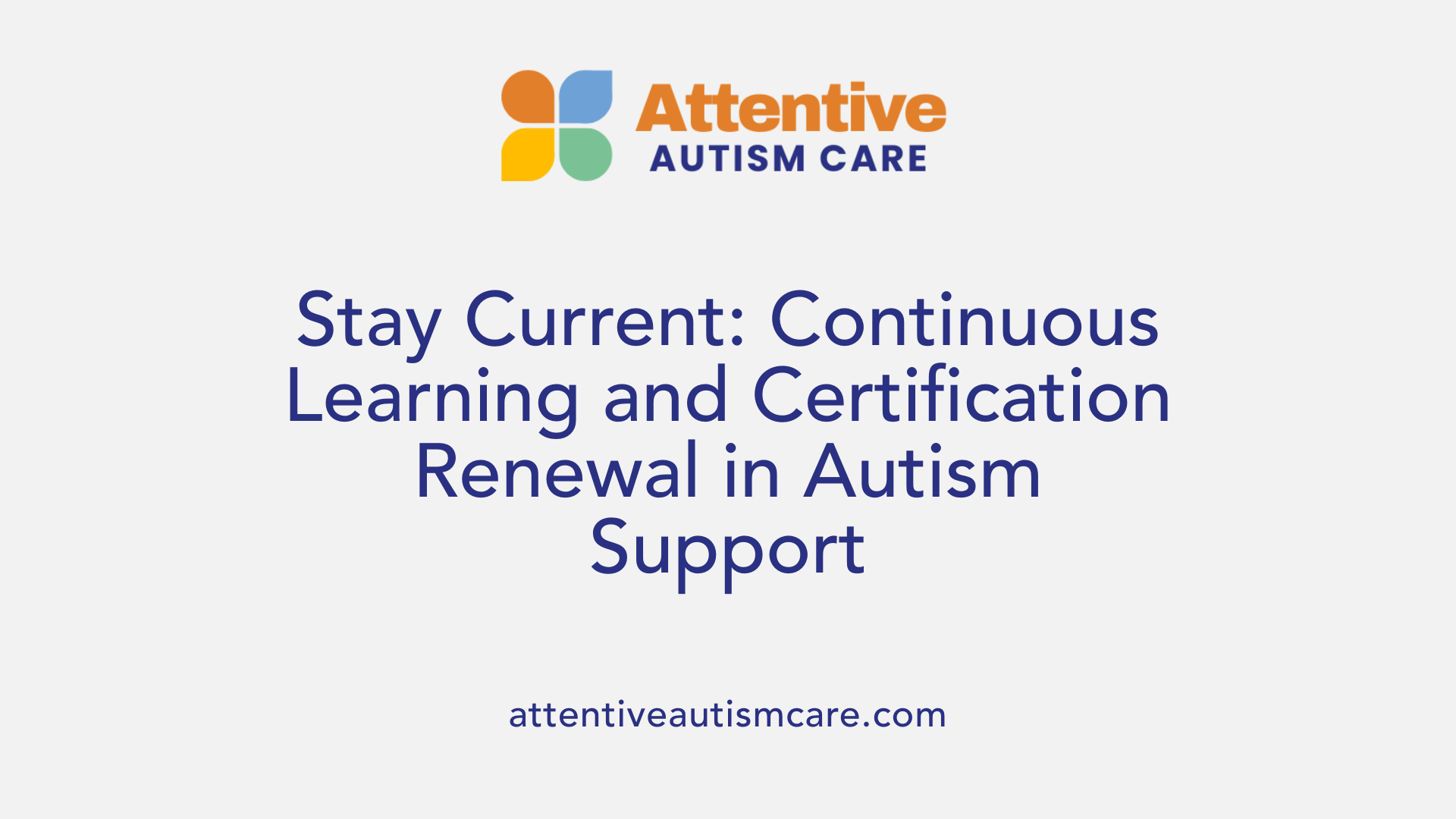
What are the steps to become an autism support teacher?
Becoming an autism support teacher typically involves several educational and professional steps. First, aspiring teachers must earn at least a bachelor’s degree in fields such as special education, psychology, speech-language pathology, or occupational therapy. During this phase, completing a state-approved teacher preparation program that includes supervised student teaching is crucial. This practical experience, which usually lasts between three to 12 months, allows prospective teachers to develop hands-on skills in real classroom settings.
Next, candidates must obtain licensure or certification, which involves passing standardized examinations and completing background checks. Each state may have specific exam requirements, such as the GACE in Georgia or other assessments relevant to their licensing standards. Once licensed, many professionals pursue additional qualifications like a master's degree in special education or autism studies, which can improve employment prospects and earning potential.
Gaining relevant experience through internships, volunteering, or roles such as teaching assistants adds invaluable practical knowledge. Certifications from organizations like IBCCES—such as the Certified Autism Specialist™ (CAS) or Autism Certificate—are also beneficial. These certifications focus on autism overview, behavior management, and program development, and often require a bachelor’s degree plus work experience or CE hours.
Once in the profession, continuous learning is essential. Teachers should engage in ongoing professional development through courses, workshops, and conferences that focus on evidence-based strategies and new research findings. This approach ensures that they remain competent and effective in supporting children with autism.
What are the latest trends in professional development for autism teachers?
The field of autism education continually evolves with new research and methodologies. To keep pace, educators are encouraged to participate in ongoing learning opportunities, including online courses, webinars, and local workshops that focus on the latest evidence-based practices.
Certifications such as the ASD Specialist and ABA (Applied Behavior Analysis) training are increasingly valued. These allow teachers and support staff to deepen their expertise in specific therapeutic techniques. Renewal of certifications often involves earning continuing education (CE) hours, which can be accumulated through seminars, online modules, or specialized training programs.
Advanced credentials like the IBCCES Advanced Certified Autism Specialist (ACAS) or additional autism-related certificates enable educators to specialize further in areas such as behavior intervention and best practices in autism support. Keeping certifications current involves understanding renewal requirements, which typically include paying fees and completing a set number of CE hours.
How do continuing education courses and certifications contribute to career growth?
Continuing education helps autism support teachers stay updated with the latest trends and research, ensuring they provide the most effective interventions. It also opens pathways to advanced roles, such as lead autism specialists, program coordinators, or trainers within schools or clinics.
For example, obtaining a Board Certified Behavior Analyst (BCBA) certification is highly regarded and can lead to leadership roles in behavioral intervention programs. Similarly, specialized certifications in speech-language pathology or occupational therapy complement teaching skills and expand service options.
| Aspect | Details | Additional Information |
|---|---|---|
| Certification Types | ASD Specialist, BCBA, ABA, CAS, AC | Certifications vary by focus, requiring specific qualifications |
| Renewal Requirements | CE hours, fees, sometimes exams | Needed to maintain certification validity |
| Training Formats | In-person workshops, online courses, webinars | Flexible options for working professionals |
| Typical Costs | Range from $295 to $495 | Varies based on program and level of certification |
| Beneficiary Roles | Teachers, therapists, behavior analysts | Enhances skills and career advancement opportunities |
Engaging regularly in professional development ensures autism support educators are equipped with skills aligned with current best practices, fostering better outcomes for the children they serve.
Key Skills and Qualifications for Success
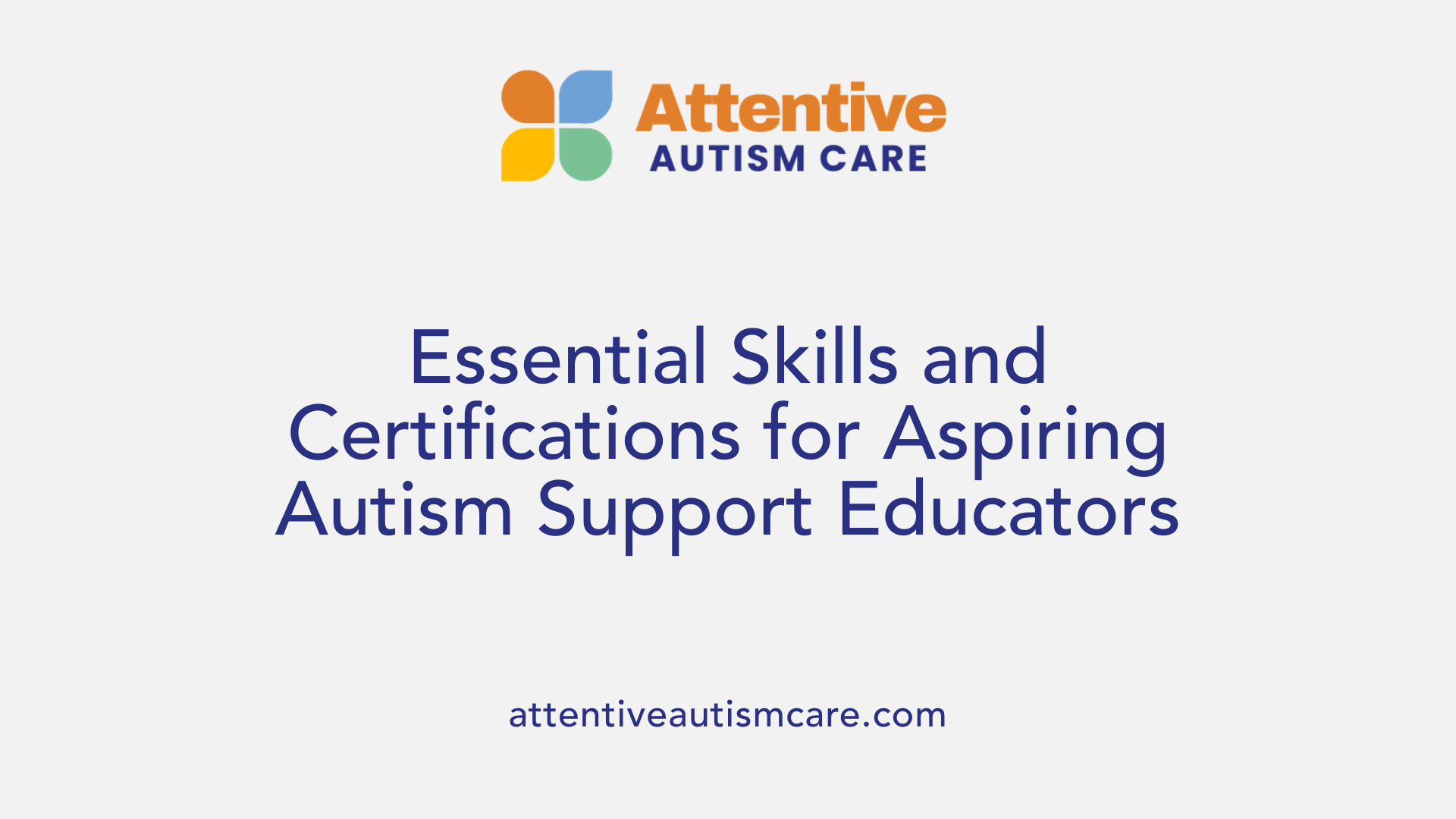
What skills and qualifications are necessary for a career in autism support teaching?
Entering the field of autism support teaching requires a combination of specific skills, educational background, and certifications. Employers frequently seek candidates who possess foundational knowledge in special education and practical skills related to individualized teaching plans.
The most commonly desired skills include expertise in 'Special Education', developing and managing 'Individualized Education Programs (IEP)', and effective 'Lesson Planning'. These abilities enable teachers to tailor educational experiences to meet each student's unique needs and learning styles.
In addition to technical skills, the core job requirements often emphasize 'Teaching', 'Communication', and 'Planning'. These are vital for engaging students, collaborating with families and team members, and organizing classroom activities efficiently.
Strong communication skills are essential not just for student interaction but also for coordinating with other professionals like speech therapists, occupational therapists, and behavioral specialists. Organization and attention to detailed documentation are critical for tracking progress and adjusting strategies as necessary.
Educational requirements typically include at least a bachelor's degree, with specialized programs in 'Special Education and Teaching, General' being the most popular, recording over 22,600 completions in 2023. All states mandate a bachelor’s degree in education or a related field, and some prefer or require a master’s degree, especially for advanced roles.
Parallel to formal education, certification programs such as those offered by IBCCES, including the Certified Autism Specialist™ (CAS) and Autism Certificate (AC), provide additional credentials. These programs focus on autism-specific knowledge areas like behavior management, IEP development, and early childhood identification.
Furthermore, gaining practical experience through student teaching—ranging from three to 12 months—is necessary across all states. Many pathways also include online training options and career-specific certifications for working professionals, such as Registered Behavioral Technician (RBT) or Board Certified Behavior Analyst (BCBA).
In summary, a mix of relevant degrees, specialized training, and hands-on experience forms the foundation for a successful career in autism support teaching.
| Degree and Certification | Common Requirements | Additional Details |
|---|---|---|
| Bachelor's Degree | Required in all states | Usually in Education, Psychology, or related fields |
| Master's Degree | Preferred or required in some states | In Special Education or related disciplines |
| Certification | Necessary for license and practice | Includes Praxis exams, background checks |
| Specialized Autism Certifications | Optional but beneficial | Examples: CAS, AC, BCBA |
Understanding these qualifications and skill sets helps prospective educators navigate the pathway into autism support roles and excel in providing tailored educational experiences.
Conclusion: Making a Difference in Students’ Lives
What qualifications, experience, and skills are essential for autism support teachers?
Aspiring autism support teachers typically start with a bachelor's degree, often in fields like Special Education, Psychology, Speech-Language Pathology, or Occupational Therapy. For most states, this degree is a fundamental requirement, with some states favoring or requiring a Master’s degree in Special Education or a related field for advanced positions.
Experience levels sought by employers vary. In over half of the job postings (58%), employers look for candidates with 0-1 years of experience, making entry into the profession accessible for new graduates. However, strong practical experience gained through student teaching, internships, or volunteering — usually lasting three to twelve months — significantly enhances a candidate's prospects.
Among the most valued skills are understanding of Individualized Education Programs (IEP), lesson planning, communication, and teaching abilities. Personal characteristics such as empathy, patience, adaptability, creativity, organization, and positivity help enable teachers to build trusting relationships and respond effectively to students' needs.
Why is continuous professional growth important?
Professional development is crucial in this evolving field. Certifications like the Certified Autism Specialist™ (CAS) or Autism Certificate (AC) from IBCCES, which require ongoing education and experience, help educators stay current with best practices. These certifications cover a broad perspective of autism, including managing behaviors, developing educational programs, and communication strategies.
Many certificated professionals - including teachers' aides, behavior analysts, or speech-language pathologists - also pursue specialized training in applied behavior analysis (ABA) or become Board Certified Behavior Analysts (BCBA). Continuous learning through workshops, certification renewals, and advanced degrees ensures these professionals remain effective and innovative in their roles.
What makes this profession rewarding?
Working with autistic children is often described as deeply fulfilling. The impact teachers have on their students' lives—helping them gain independence, build social skills, and improve communication—creates a profound sense of achievement. The role requires dedication, but many report that witnessing a child's progress and moments of breakthrough make all the effort worthwhile.
This profession also offers opportunities for collaboration with families and a variety of specialists, fostering a team-based approach to support each child's unique development. Whether through direct teaching, behavioral intervention, or support roles, working in autism education provides a chance to make a meaningful difference.
| Aspect | Details | Additional Notes |
|---|---|---|
| Education | Bachelor’s degree in Special Education or related field; Master’s may be preferred or required in some states | Degree programs focus on autism, behavior management, and inclusive teaching techniques |
| Experience | 0-1 years generally preferred; practical experience crucial | Internships and student teaching help build necessary skills |
| Certifications | Autism Spectrum Disorder (ASD) Specialist, BCBA, ABA training | Certifications enhance job prospects and professional competence |
| Skills | Communication, Planning, Empathy, Patience | Additional skills include creativity and adaptability |
| Personal Traits | Positivity, Attentiveness, Curiosity | Traits crucial for building relationships and managing challenges |
Understanding these qualifications and characteristics can help guide aspiring teachers on their journey. Continuous professional growth, through certifications, advanced degrees, and practical experience, ensures they remain effective and fulfilled.
The reward of supporting students with autism extends beyond just academic success. It includes fostering independence, confidence, and social integration—fundamental aspects of quality of life. Many educators find that making a tangible difference in their students’ lives is the most enriching part of this career.
Ultimately, working as an autism support teacher is about dedication and compassion. The profession offers an opportunity not only to teach but to truly shape the futures of young learners with autism, leaving a lasting impact on their lives and the community as a whole.
The Path Forward in Autism Education
Embarking on a career as an autism support teacher requires dedication, specialized education, practical experience, and ongoing professional development. By acquiring the necessary degrees, certifications, and skills, aspiring educators can make a meaningful difference in the lives of children with autism. The field offers not only personal fulfillment and professional growth but also the chance to contribute profoundly to fostering inclusion and supporting diverse learners in educational settings.
References
- Autism Teachers: How to Become One - Franklin University
- How Do You Become an Autism Support Teacher?
- Certification Programs for Autism & other Cognitive Disorders - ibcces
- What Degree would I need to work with autistic children
- How to become an autism teacher - CareerExplorer
- How to Become a Certified Autism Specialist - GSEP Blog
- What does an Autistic Teacher do? Career Overview, Roles, Jobs
- How To Become an Autism Support Teacher - ABATherapistJobs.com
- Job Profile: Autism Support Teacher - Top Education Degrees
- How to Become a Certified Autism Specialist - GSEP Blog




































































































